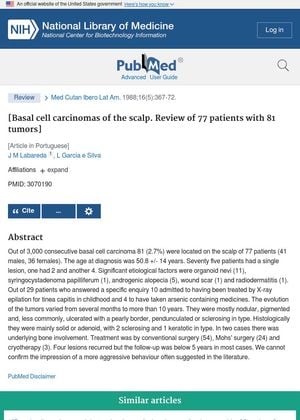Basal Cell Carcinomas of the Scalp: Review of 77 Patients with 81 Tumors
January 1988
in “
PubMed
”
basal cell carcinoma androgenic alopecia organoid nevi syringocystadenoma papilliferum radiodermatitis X-ray epilation tinea capitis arsenic-containing medicines nodular pigmented ulcerated pearly border pendunculated sclerosing solid adenoid keratotic bone involvement conventional surgery Mohs' surgery cryotherapy BCC hair loss skin lesion radiation therapy scalp infection arsenic treatment skin nodule skin pigmentation skin ulcer pearly skin lesion skin growth skin hardening skin surgery Mohs surgery cold therapy

TLDR The review found that basal cell carcinomas on the scalp are not more aggressive than those in other locations.
In a review of 3,000 basal cell carcinoma cases from 36 years ago, 81 tumors (2.7%) were found on the scalp of 77 patients (41 males, 36 females). The average age at diagnosis was 50.8 years. Most patients had a single lesion, but two had multiple. Etiological factors included organoid nevi (11 cases), syringocystadenoma papilliferum (1 case), androgenic alopecia (5 cases), wound scar (1 case), and radiodermatitis (1 case). Of 29 patients who responded to a specific inquiry, 10 had been treated with X-ray epilation for tinea capitis in childhood and 4 had taken arsenic-containing medicines. The tumors' evolution varied from several months to over 10 years. They were mostly nodular, pigmented, and less commonly, ulcerated with a pearly border, pendunculated, or sclerosing. Histologically, they were mainly solid or adenoid, with 2 sclerosing and 1 keratotic. Two cases had underlying bone involvement. Treatment methods included conventional surgery (54 cases), Mohs' surgery (24 cases), and cryotherapy (3 cases). Four lesions recurred, but most follow-ups were under 5 years. The study did not confirm the often-suggested more aggressive behavior of these tumors.





